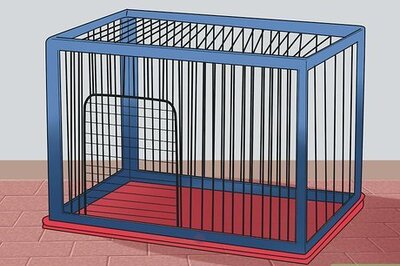
views
Brega: Muammar Gaddafi's forces struck at rebel control of oil export hubs in Libya's east for a second day on Thursday as Arab states weighed a plan to end turmoil Washington said could make the country "a giant Somalia."
A leader of the uprising against Gaddafi's 41-year-old rule said he would reject any proposal for talks with Gaddafi to end the conflict in the world's 12th largest oil exporting nation.
Witnesses said a warplane bombed the eastern oil terminal town of Brega, a day after troops loyal to Gaddafi launched a ground and air attack on the town that was repulsed by rebels spearheading a popular revolt against his four-decade-old rule.
The rebels, armed with rocket launchers, anti-aircraft guns and tanks, called on Wednesday for UN-backed air strikes on foreign mercenaries it said were fighting for Gaddafi.
But perhaps mindful of a warning by Gaddafi that foreign intervention could cause "another Vietnam," Western officials expressed caution about any sort of military involvement including the imposition of a no-fly zone.
A rebel officer said government air strikes targeted the airport of Brega and a rebel position in the nearby town of Ajdabiyah, referring to two rebel-held locations.
Opposition soldiers also said troops loyal to Gaddafi had been pushed back to Ras Lanuf, home to another major oil terminal and 600 km (375 miles) east of Tripoli.
"Gaddafi's forces are in Ras Lanuf," Mohammed al-Maghrabi, a rebel volunteer, told Reuters, echoing comments by others.
Revolt has ripped through the OPEC-member country and knocked out nearly 50 percent of its 1.6 million barrels per day output, the bedrock of the country's economy.
The uprising, the bloodiest yet against long-serving rulers in the Middle East and North Africa, is causing a humanitarian crisis, especially on the Tunisian border where tens of thousands of foreign workers have fled to safety.
As the struggle between Gaddafi loyalists and rebels who have taken swathes of Libya intensified, Arab League Secretary-General Amr Moussa said a peace plan for Libya from Venezuela's President Hugo Chavez was under consideration.
"We have been informed of President Chavez's plan but it is still under consideration," Moussa told Reuters on Thursday. "We consulted several leaders yesterday," he said.
Moussa said he had not agreed to the plan and did not know whether Gaddafi had accepted it.
Oil fell on news of the plan. Brent crude fell more than $3 to $113.09 per barrel as investors eyed a possible deal brokered by Chavez, a close friend of Gaddafi.
Al Jazeera news said Chavez's plan would involve a commission from Latin America, Europe and the Middle East trying to reach a negotiated outcome between the Libyan leader and rebel forces.
The network said the chairman of the rebels' National Libyan Council, Mustafa Abdel Jalil, rejected entirely the concept of talks with Gaddafi.
In a push east, government troops, backed by air power, on Wednesday briefly captured Brega.
Opposition forces took back the town they have held for about a week, rebel officers said. They were ready to move west toward the capital, they said, if Gaddafi refused to quit.
Basking in the adulation of loyalists in Tripoli on Wednesday, Gaddafi launched into a tirade against the "armed gangsters" he said were behind the unrest, part of a conspiracy to colonize Libya and seize its oil.
"We will enter a bloody war and thousands and thousands of Libyans will die if the United States enters or NATO enters," Gaddafi told Tripoli supporters at a gathering televised live.
"We are ready to hand out weapons to a million, or 2 million or 3 million, and another Vietnam will begin."
Secretary of State Hillary Clinton said in Washington that one of the biggest US concerns was "Libya descending into chaos and becoming another Somalia."
The Libyan government has tried to persuade people in Tripoli that life continues as normal, but the crisis was affecting everyday life.
There were queues outside banks and residents said food prices had gone up, while the street value of the Libyan dinar had fallen dramatically against the dollar.
A fish market near Tripoli's central Green Square was mostly empty. A customer who came looking for fresh fish went away empty-handed.
"The situation is affecting us," said Ismail, a fisherman. "All the Egyptian workers who run the boats have left."
Wednesday's assault on Brega appeared to be the most significant military operation by Gaddafi since the uprising erupted in mid-February and set off a confrontation that Washington says could descend into a long civil war unless Gaddafi steps down.
A Twitter message on Thursday, which could not be corroborated, spoke of reinforcements for Gaddafi forces.
"Cars reported to be full of mercenaries with the intention of joining the battalion outside Ras Lanuf to head to Brega to regain," read the message from ShababLibya (Libyan Youth Movement). "It seems 70 cars have arrived near the town of Ras Lanuf to support a battalion to attack the city of Brega and regain airport."
Dutch soldiers held
The Dutch Defense Ministry said Libyan authorities had arrested three Dutch soldiers on Sunday when they tried to evacuate a Dutch citizen from Sirte, east of Tripoli.
Libya's deputy ambassador to the United Nations, one of the first Libyan diplomats to denounce Gaddafi and defect, said the United Nations may back a resolution for a no-fly zone if the newly constituted National Libyan Council requested it officially.
The US government is cautious about imposing a no-fly zone, stressing the diplomatic and military risks involved, but has moved warships into the Mediterranean.
Any sort of foreign military involvement in Arab countries is a sensitive topic for Western nations uncomfortably aware that Iraq suffered years of bloodletting and al Qaeda violence after a 2003 US-led invasion toppled Saddam Hussein.
The Arab League said it was against direct outside military intervention, but could enforce a no-fly zone in cooperation with the African Union. Realistically though, only the United States could carry out such an operation.
Spain became the latest European country to offer help to refugees, saying it would send a plane loaded with humanitarian aid to the Tunisian-Libyan border on Thursday. The plane will be used to ferry Egyptian migrants from Djerba to Cairo.




















Comments
0 comment